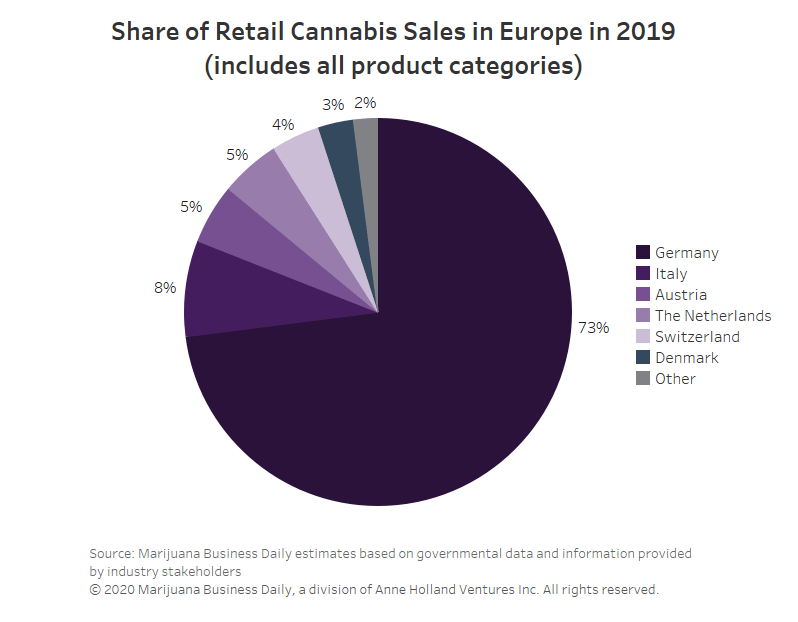The Czech Republic is a minor player among medical cannabis markets in Europe, but that might be about to change thanks to a recent policy alteration involving the country’s health insurance.
Since Jan. 1, the Czech Republic’s public health insurance has been extended to cover medical cannabis under certain conditions.
The inclusion of cannabis is already starting to bear fruit, although limited participation by physicians and pharmacies could pose hurdles for the market.
In the first four months of 2020, almost 16 kilograms (35 pounds) of medical cannabis were sold, about the same as the total sold in all 2019 – signaling that the market could be in store for significant growth this year.
And, looking ahead, the Czech government is weighing changes that could open up the medical cannabis market to more competition and business opportunities.
Before the change in insurance coverage, revenue opportunities in the Czech Republic were limited.
The low growth experienced by the Czech medical cannabis market since 2015 exemplifies a common misconception in the international medical marijuana industry: that medical cannabis legalization immediately unleashes exponential market growth.
Experts have warned executives against adopting such an expectation – commonly found in the news releases of Canadian marijuana companies depicting near-term projections in the billions of dollars.
In the Czech Republic’s relatively small market, most product has been supplied by a single domestic grower, Elkoplast Slušovice, and the company’s contract with the government was recently extended.
In the past, Canadian producers including Canopy Growth, Aurora Cannabis and Tilray have exported small quantities to the country.
Health insurance coverage
Since earlier this year, Czech patients have been entitled to insurance coverage of 90% of the retail price for 30 grams of flower per month for medical use, regardless of THC content.
In exceptional cases, doctors may authorize quantities exceeding the monthly limit of 30 grams for reimbursement, but the limit cannot exceed 180 grams per month.
Tomas Kubálek, CEO of Czech Medical Herbs, an independent importer of medical cannabis, told Marijuana Business Daily that the new health insurance coverage was a “big step forward” because it “removes one of the main obstacles for patients: affordability.”
However, Kubálek sees some shortcomings in the new framework.
One of the problems is that the government fixed prices across the supply chain, with pharmacies now barely making any profit from dispensing cannabis flower.
The consequence of this is limited incentive for pharmacies to sell cannabis flower, according to Kubálek.
Another shortcoming is bureaucratic in nature.
“The Ministry of Health has introduced 64 possible prescription codes for cannabis. Each code represents a type of cannabis with a precisely defined content of THC and CBD,” Kubálek said.
In the Czech Republic, there’s a tolerance of 20% of the declared cannabinoid content.
That’s unlike Germany, where the monograph for cannabis flower establishes, among other things, that the deviation cannot be of more than 10% from the declared THC and CBD value.
In the Czech Republic, Kubálek said, different batches of the same product could end up falling “under more than half a dozen different e-prescription codes.”
In other words, physicians might have to use different e-prescription codes for the same product each time they prescribe it.
“This has caused great resentment and confusion among doctors, pharmacists and patients,” Kubálek said.
“A doctor told me he had to rewrite several times prescriptions that came back to him with an incorrect or pharmacy-unavailable e-prescription code,” Kubálek said, wondering “how long doctors would be willing to prescribe considering the hurdles and how many new doctors will want to join this confusing and unnecessarily complicated system.”
That effectively creates negative incentive for doctors to prescribe cannabis, creating a problem in a key part of the medical program.
Same domestic producer
Since the Czech Republic’s medical cannabis program began, Elkoplast Slušovice has been the only domestic producer.
The government buys all of Elkoplast Slušovice’s product, which is then stored in the warehouse of the only authorized distributor, Alliance Healthcare.
As of mid-May, 91 pharmacies were authorized to buy Czech-grown cannabis from that distributor and sell it to patients.
On Dec. 12, 2019, the Czech government initiated the application process to contract out one domestic grower for the next four years. Again, only one company applied and won: Elkoplast Slušovice.
According to official documentation viewed by MJBizDaily, Elkoplast Slušovice will be able to sell 50 kilograms of flower over a period of four years.
At a price of 134 Czech koruna ($5.42) per gram, the contract between government and grower totals almost 250,000 euros ($274,000).
Two subcontractors are included in the contract, one to do analytical testing and the other to irradiate the products.
Questions surround process
According to Kubálek, the latest application process was “legally unquestionable but morally wrong.”
The Czech State Institute for Drug Control (SÚKL) announced the application process on Dec. 12, 2019, and allowed only one month for prospective growers to submit bids.
By contrast, the first public tender in 2014 had four months from announcement to deadline.
Elkoplast Slušovice has been the sole grower since the beginning of the country’s medical cannabis program because it has been the only winner of five cultivation tenders. In most cases, it was the only applicant.
“Why the special rush during a time when most are enjoying the Christmas holidays?” Kubálek asked himself.
In his view, Czech taxpayers, who are ultimately footing the bill, would’ve benefited from a more publicized application process and a longer period of time for companies to evaluate the tender and submit their offers.
“There wasn’t the slightest mention in the media,” Kubálek told MJBizDaily.
He wondered why the government didn’t make efforts to better publicize the application process.
“The five public tenders so far have faced serious problems because, in most cases, just one or, in one case, zero companies applied, and continuity of supply has been far from ideal,” Kubálek said.
Plans to fundamentally change the conditions for granting cultivation licenses and open the market to free competition are being considered in the Czech Republic.






